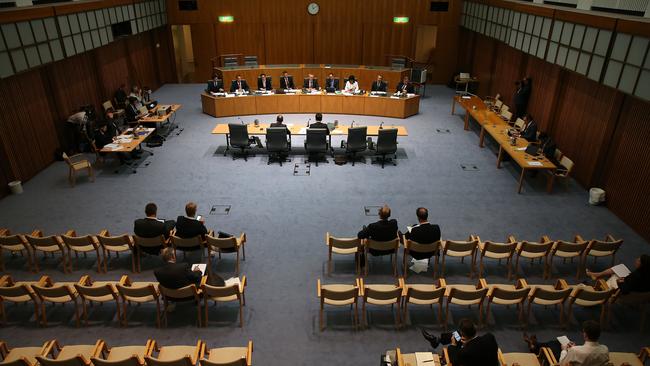No use looking back in anger at overhauled banks
The banks are largely to blame for a now almost inevitable inquiry that will fail to provide any insights into the sector.

The politicisation of the sector, over a very lengthy period, means that there is no sense of context or perspective.
The banks are charged with profit gouging because their profits are large but with no regard to their size — the four majors have total assets of about $3.5 trillion and more than $235 billion of shareholders’ funds — or their nature and complexity.
While in absolute terms their profits, which totalled $31.5bn last financial year, might appear large, along with their average return on equity of 13.9 per cent, these are institutions that are highly-leveraged — every dollar of capital is geared about 15 times with other people’s money.
By international standards the banks might appear very profitable, but that’s because their international peers (other than the Canadians), nearly a decade after the financial crisis, still struggle to recover their cost of capital. Many eurozone banks are still stuffed full of non-performing loans.
The Australian banks are also among the most efficient full-service banks in the world.
Bank critics refer to them as if they were completely self-contained and self-interested entities. They’re not. They are intermediaries. They fund themselves with deposits, loans from other institutions (mainly offshore lenders) and shareholder capital.
When politicians, and others, complain about the harsh treatment some bank customers receive when they default on their loans, they ignore the responsibility the banks have to those “other people” to protect their loans and capital.
While there is no dispute that some low-level banks employees — mainly financial advisers — have behaved badly, there is no sense of perspective in the discussion about the banks’ “cultural issues.”
The major banks’ chief executives have been given a tough time in their now regular grillings by Parliament’s economics committee over the number of financial advisers they have sacked or disciplined over recent years, even though the actual percentage of their financial advisers involved is minuscule and that many of the “breaches” that the Australian Securities and Investments Commission takes credit for unearthing were actually self-reported by the banks.
External reviews of most of the issues that have galvanised Labor, Greens and, now, Nationals politicians have consistently concluded that there aren’t systemic issues within the system. With the four majors employing about 175,000 people between them, and given the nature of their businesses, it isn’t that surprising there are some individual "bad apples" within them.
The problem with calling a commission of inquiry, or royal commission, into the banks is that history isn’t much of a guide to their present state or settings.
That’s partly because of the plethora of new regulations and responsibilities imposed on them by the Turnbull Government and the Australian Prudential Regulation Authority and partly because of their own actions in recent years as Labor’s call for a royal commission intensified the pressure on them.
APRA, flowing from the global response to the financial crisis and the recommendations of our own Financial System Inquiry, has significantly increased the core capital requirements for the majors. It has also required them to hold more and higher quality liquidity.
It has also adopted macroprudential measures to try to dampen what it, and the Reserve Bank, regarded as overheating segments of the property market, raising mortgage risk-weights, putting limits on growth in lending for investment properties, advocating more conservative loan-to-valuation ratios and discouraging growth in fixed-rate lending.
The Turnbull Government has introduced a tax surcharge for the majors and Macquarie that will raise $6bn over four years, is introducing the Banking Executive Accountability Regime with draconian penalties for individual senior executives and their institutions for the behaviour of their employees.
APRA, which is already investigating the culture of Commonwealth Bank, is to be given more authority to remove and disqualify executives as well as to involve itself in the setting of senior-level remuneration.
There is a Productivity Inquiry into competition, the Government’s commitment to "open banking" or customer data-sharing and a host of actions taken by the banks themselves in response to the criticism and the threat of a Royal Commission.
The majors have steadily being ticking off most of the issues likely to be aired within a formal inquiry.
They commissioned an independent review of their remuneration and incentive structures and generally are ditching sales commissions for customer-facing staff.
They have established better and more formal customer complaints-handling structures and processes, supported strengthened external dispute resolution schemes and advocated the establishment of an industry-wide and mandatory last-resort compensation scheme. They’ve introduced "whistleblower" protection frameworks and are working on a register of individuals who have breached standards of conduct.
While a parliamentary commission of inquiry might rake over the cold coals of past incidents — including the more recent bank bull swap rate rigging allegations and Austrac’s action against CBA alleging money-laundering — those have either been dealt with or will be dealt with by ASIC or the courts.
By the time the inquiry would be finished, the majors would also have either exited or significantly downgraded their exposure to the wealth management businesses that have been the key source of damage to their reputations.
If there is an inquiry it will go for a year or more, cost bank shareholders millions of dollars and many hours of lost time for their executives and senior staff.
The litany of woes from a very lengthy queue of customers unhappy about their treatment when they defaulted on their loans or their financial adviser gave them poor or conflicted advice or their bank-owned insurer adopted an overly legalistic approach to a claim will be damaging for the banks, regardless of the remedial actions they and the government and their regulators have taken.
It could also be damaging to their reputations offshore, where the scandalous headlines will be seen without context.
It’s probably not going to materially impact the banks’ ability to borrow offshore, or the cost of those borrowings, unless the inquiry happens to coincide with another financial crisis. That can’t be discounted, given the current levels of debt around the globe, the peculiar and quite stretched settings in financial markets and the geopolitical tensions.
The problem for the banks, and the Turnbull government, is that neither of them has been able to convey in a coherent and digestible way just how comprehensive the response — by the government and the banks themselves — to the banks’ behavioural failures of the past has been.
That response should have rendered a commission of inquiry irrelevant. That it hasn’t says that the banks themselves are largely to blame for not recognising early enough — and responding decisively enough at the time — to the threat posed by the burst of customer-related issues that emerged post-crisis and by their subsequent politicisation by an opportunistic Bill Shorten.






It now appears almost inevitable that there will be a commission of inquiry, albeit perhaps not a Royal Commission, into the banks. It would probably be hopelessly optimistic to think that it might provide a better insight into the nature of the banks and their system than that provided by politicians and other bank bashers.